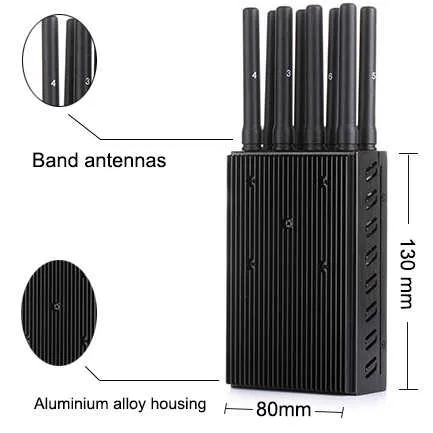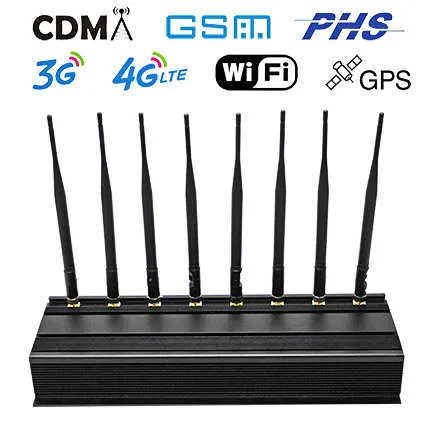Please consult relevant authorities before using the drone jammer kit
Drone jammers are an inexpensive and effective way to prevent other drones from flying into your home. Depending on the type of drone you want to block, you can choose a device that interferes with any radio signals the drone uses to communicate. Many drones do this using GPS, WiFi, or a simple handheld controller. If your neighbor's quadcopter is annoying you and other neighbors, you can use a drone jammer to block the signal. These uav jammer can be easily built for less than $50 new and less than $50 old.
The Importance of Drone Signal Jammers
A drone signal jammer is a device that prevents a commercial drone from sending a signal to its controller. The device works by simultaneously blocking drone flight control signals and satellite positioning signals. Its powerful jamming capabilities can prevent drones from operating normally. If it detects the presence of a wifi blocker, it will either land, return to the launch site, or plummet to the ground. Therefore, it is necessary to consider the impact of such equipment before purchasing.
Drone signal jammers can prevent crime or terrorism. However, many European countries have banned the sale of these jammers within their borders. Therefore, it is crucial to check local laws before buying. Additionally, you need to understand the risks associated with using drones in your area. These jammers can cause software bugs, which can be difficult to identify. Fortunately, there are legal ways to keep drones from invading your neighborhood.
How effective are drone jammers for sale?
You've probably seen commercials that sell drone jammers, but how effective are they? Drones use radio waves to communicate. This communication can be via GPS, WiFi or a simple handheld controller. Someone could jam this communication with a drone jammer. These drones aren't the only ones being hit buy jammers. They can also be used by unauthorized devices to spy on people and their property.
When you use a drone jammer, it blocks the signal sent by the drone. A drone jammer will prevent drones from communicating with other drones. This will stop the drone from working and allow you to trace it back to its original location. Additionally, if you capture a drone in an interference zone, you can use the information gathered for forensic investigations. Police will then be able to capture the drone and its owner.

How Drone Jammers Work and Their Range
Drone jammers work by jamming radio and GPS signals up to 400 meters away. For cheaper, simpler drones, the gsm jammer has a much longer range, meaning it won't destroy it. More advanced drones, on the other hand, hover above the ground and crash to the ground if hit by a jammer. In this way, privacy is preserved as the drone does not lose the ability to operate.
The problem with jamming drones is the precision required to be effective. The signal must be focused on the target, which changes direction, angle and speed as it travels. Because the drone is so small, jamming its radio signal requires great precision. Also, jamming the drone's signal will negatively affect other radio signals, which is not what we want to do! However, if we're lucky, we'll have something that stops drones from flying over people.
Protect People and Areas with Drone Jammers
Drones are increasingly dangerous in our world and they need to be protected at all costs. Drones can carry explosives or be used to smuggle illegal goods. To protect people and areas, drone jammers are essential.
A drone jammer looks like a gun and emits electromagnetic noise that overlays the drone's radio signal. Once the drone hits the drone jammer, it will return to its original origin, so operators can track down the pilot and land the drone for forensic investigation. Portable jammer work well against drones, but are illegal in the US. But drone jamming is an increasingly popular solution to security concerns.
How to make your own drone jammer
While drones are a growing problem, you can protect your home and family from them by building a drone jammer yourself. DIY drone jammers can be bought online for under $20
There are many variables to consider when making a drone jammer. One important thing to remember is that drones move so fast that it can be difficult to jam their signal with standard radio signal jammers. You also need to remember that you should not aim the drone jammer at other objects to prevent it from affecting your aim. Jammers that block RF signals can also cause other problems with your drone, so you should think carefully about this before making your own.
How to Build a Drone Jammer Kit
Buying a jammer kit is a good start, but you should keep in mind that using gps jammer is illegal in many countries. If you want to use your drone for commercial purposes, you must obtain permission from the relevant authorities before using it. Drone jammers can be found for as little as $50, so there's no reason not to buy one. Drone jammers also cost less than the cost of the drone itself.
While the use of drone jammer kits is illegal, it is gaining popularity among civilians. The kit consists of a transmitter and receiver. Launchers come in all sorts of shapes, and even look like guns. The drone itself will not be harmed. There are even kits sold without the radio signal. You can buy drone jammer kits online or at hobby stores.
Using a drone jammer is not a huge problem for the average drone pilot. However, if you plan on flying your drone near popular landmarks like the White House, it's best to avoid drone jammer kits. While drone jammers are illegal, they can interfere with other technologies. Additionally, they can violate several laws and harm drone pilots. Before using a drone jammer kit to protect your drone, you need to consult the relevant authorities.


Comments
Post a Comment